人教版英语初中七年级上册知识讲解,巩固练习(教学资料,补习资料):Unit 5 Do you have a soccer ball?课时3 Grammar
文档属性
| 名称 | 人教版英语初中七年级上册知识讲解,巩固练习(教学资料,补习资料):Unit 5 Do you have a soccer ball?课时3 Grammar | 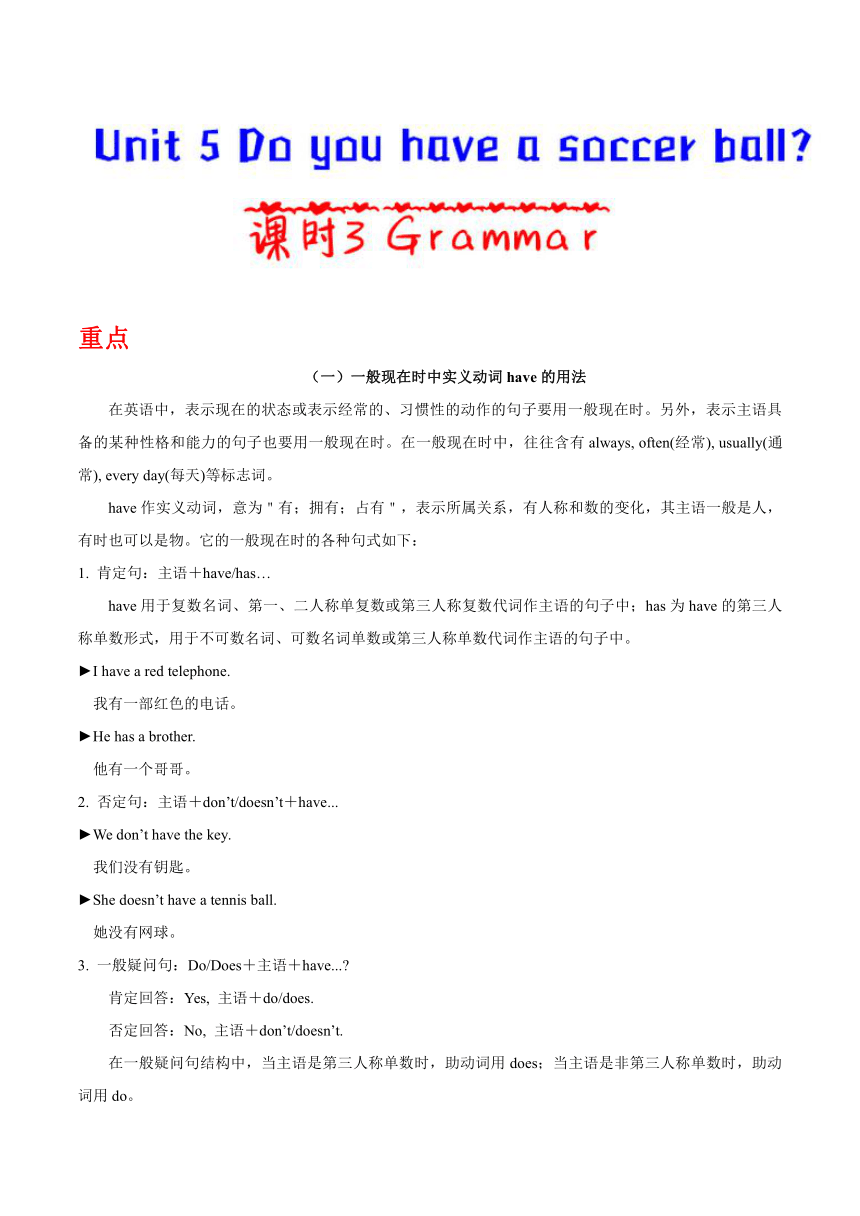 | |
| 格式 | zip | ||
| 文件大小 | 620.8KB | ||
| 资源类型 | 教案 | ||
| 版本资源 | 人教新目标(Go for it)版 | ||
| 科目 | 英语 | ||
| 更新时间 | 2019-10-01 00:29:00 | ||
图片预览

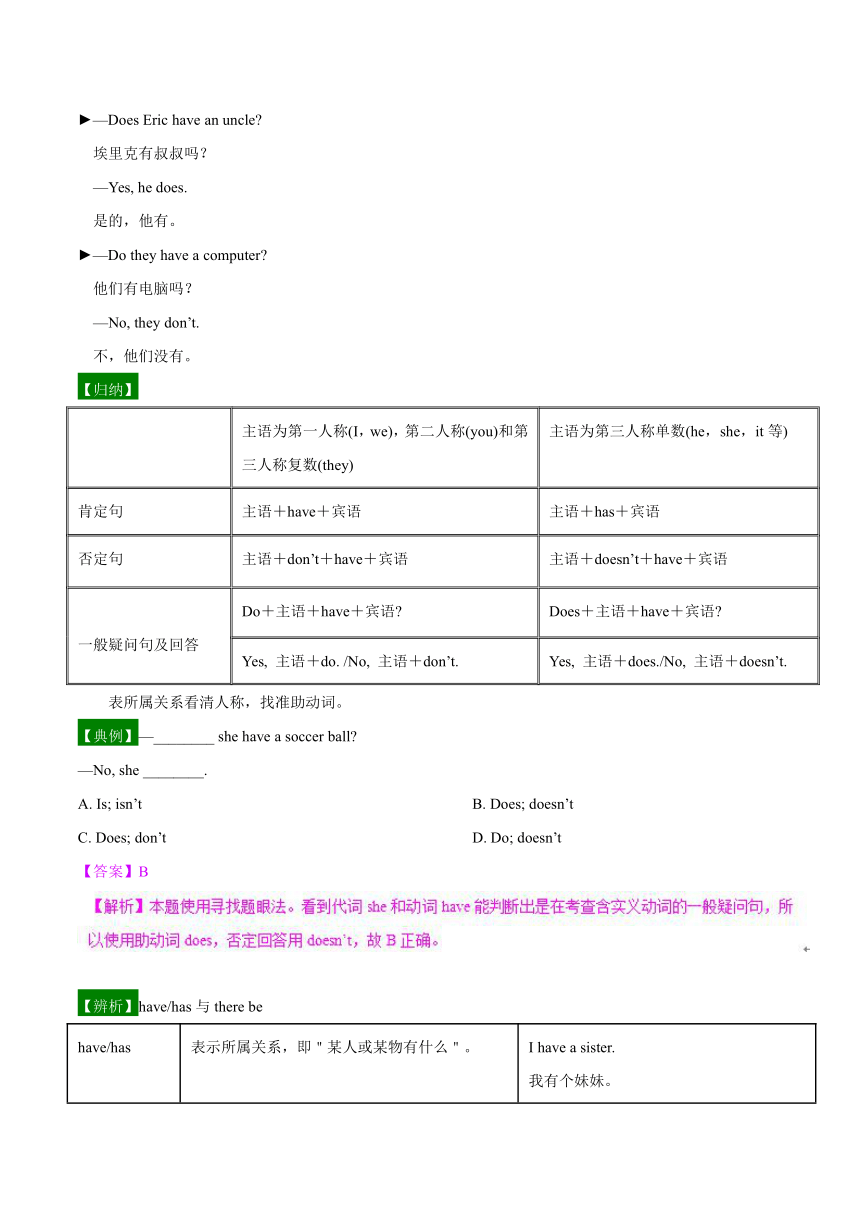
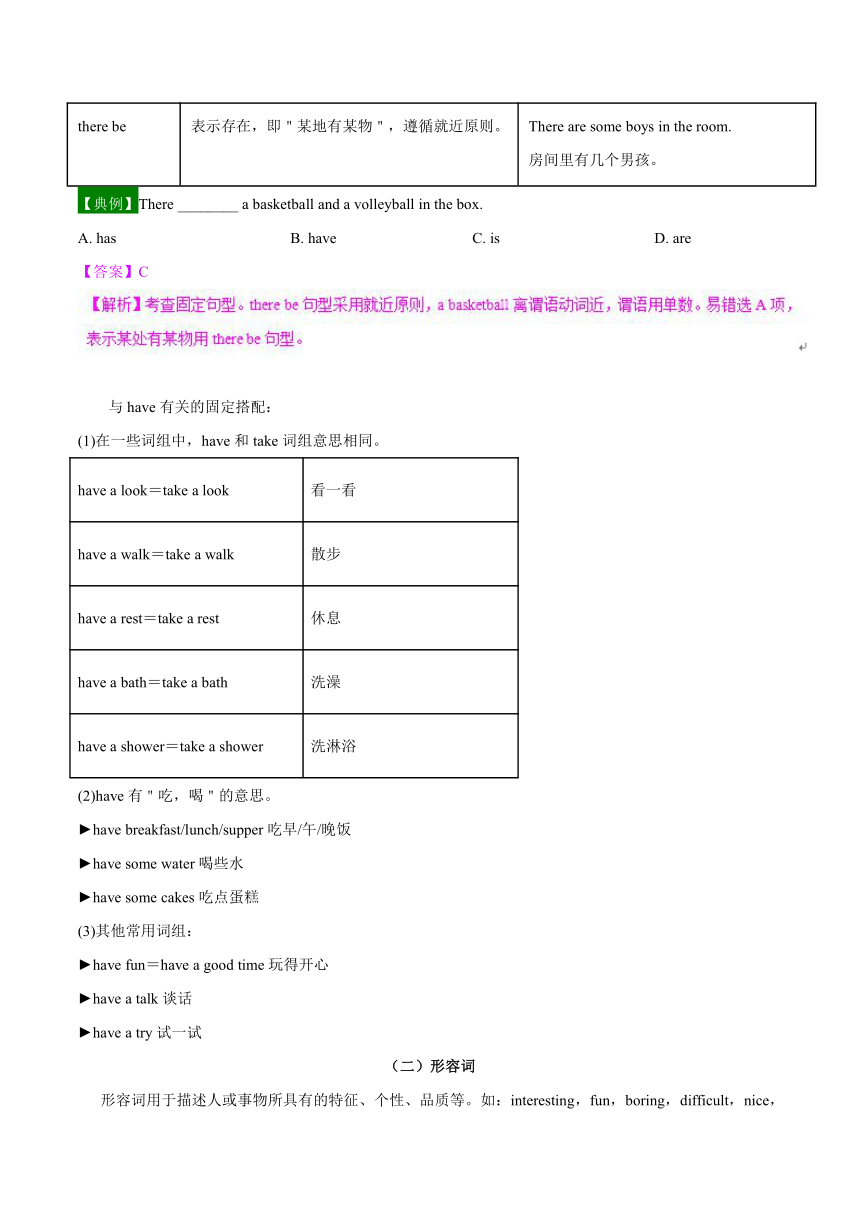
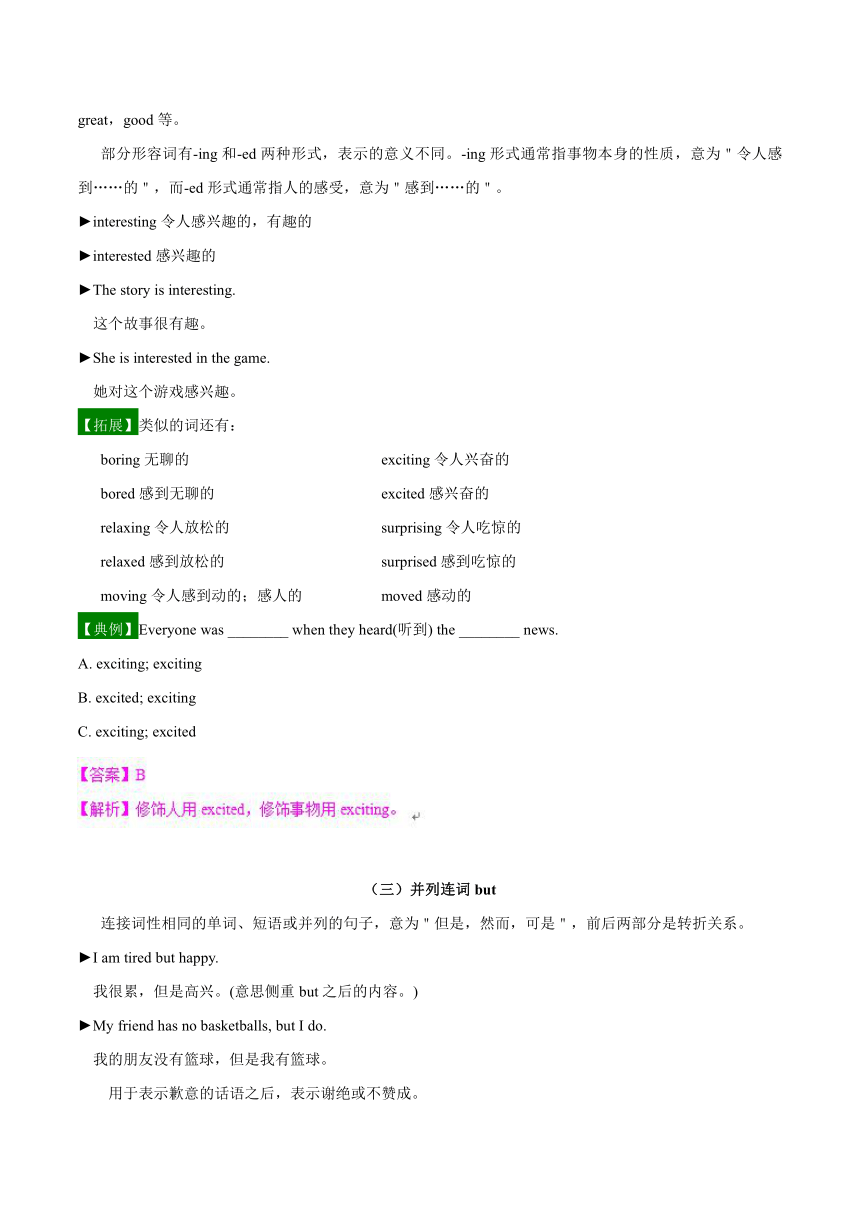
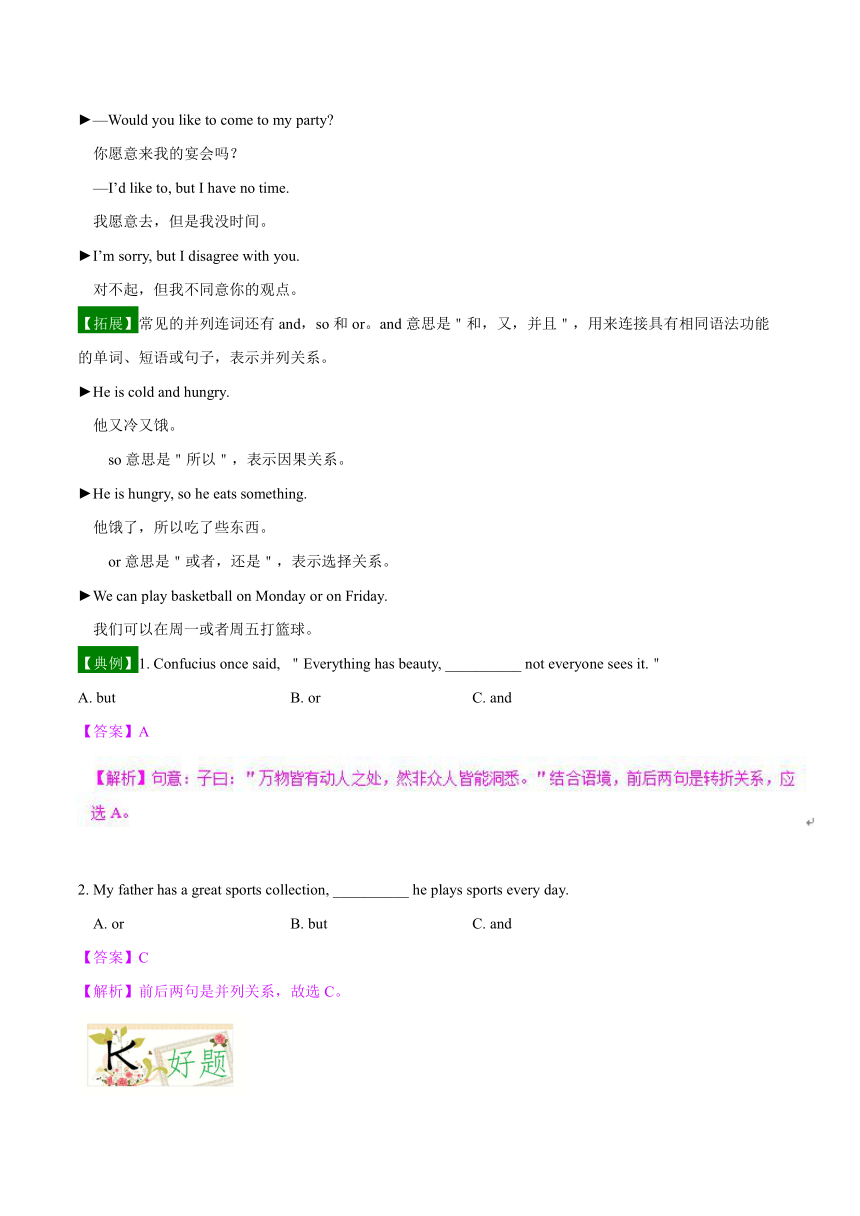
文档简介
重点
(一)一般现在时中实义动词have的用法
在英语中,表示现在的状态或表示经常的、习惯性的动作的句子要用一般现在时。另外,表示主语具备的某种性格和能力的句子也要用一般现在时。在一般现在时中,往往含有always, often(经常), usually(通常), every day(每天)等标志词。
have作实义动词,意为"有;拥有;占有",表示所属关系,有人称和数的变化,其主语一般是人,有时也可以是物。它的一般现在时的各种句式如下:
1. 肯定句:主语+have/has…
have用于复数名词、第一、二人称单复数或第三人称复数代词作主语的句子中;has为have的第三人称单数形式,用于不可数名词、可数名词单数或第三人称单数代词作主语的句子中。
?I have a red telephone.
我有一部红色的电话。
?He has a brother.
他有一个哥哥。
2. 否定句:主语+don’t/doesn’t+have...
?We don’t have the key.
我们没有钥匙。
?She doesn’t have a tennis ball.
她没有网球。
3. 一般疑问句:Do/Does+主语+have...?
肯定回答:Yes, 主语+do/does.
否定回答:No, 主语+don’t/doesn’t.
在一般疑问句结构中,当主语是第三人称单数时,助动词用does;当主语是非第三人称单数时,助动词用do。
?—Does Eric have an uncle?
埃里克有叔叔吗?
—Yes, he does.
是的,他有。
?—Do they have a computer?
他们有电脑吗?
—No, they don’t.
不,他们没有。
【归纳】
主语为第一人称(I,we),第二人称(you)和第三人称复数(they)
主语为第三人称单数(he,she,it等)
肯定句
主语+have+宾语
主语+has+宾语
否定句
主语+don’t+have+宾语
主语+doesn’t+have+宾语
一般疑问句及回答
Do+主语+have+宾语?
Does+主语+have+宾语?
Yes, 主语+do. /No, 主语+don’t.
Yes, 主语+does./No, 主语+doesn’t.
表所属关系看清人称,找准助动词。
【典例】—________ she have a soccer ball?
—No, she ________.
A. Is; isn’t B. Does; doesn’t
C. Does; don’t D. Do; doesn’t
【答案】B
【辨析】have/has与there be
have/has
表示所属关系,即"某人或某物有什么"。
I have a sister.
我有个妹妹。
there be
表示存在,即"某地有某物",遵循就近原则。
There are some boys in the room.
房间里有几个男孩。
【典例】There ________ a basketball and a volleyball in the box.
A. has B. have C. is D. are
【答案】C
与have有关的固定搭配:
(1)在一些词组中,have和take词组意思相同。
have a look=take a look
看一看
have a walk=take a walk
散步
have a rest=take a rest
休息
have a bath=take a bath
洗澡
have a shower=take a shower
洗淋浴
(2)have有"吃,喝"的意思。
?have breakfast/lunch/supper吃早/午/晚饭
?have some water喝些水
?have some cakes吃点蛋糕
(3)其他常用词组:
?have fun=have a good time玩得开心
?have a talk谈话
?have a try试一试
(二)形容词
形容词用于描述人或事物所具有的特征、个性、品质等。如:interesting,fun,boring,difficult,nice,great,good等。
部分形容词有-ing和-ed两种形式,表示的意义不同。-ing形式通常指事物本身的性质,意为"令人感到……的",而-ed形式通常指人的感受,意为"感到……的"。
?interesting令人感兴趣的,有趣的
?interested感兴趣的
?The story is interesting.
这个故事很有趣。
?She is interested in the game.
她对这个游戏感兴趣。
【拓展】类似的词还有:
boring无聊的 exciting令人兴奋的
bored感到无聊的 excited感兴奋的
relaxing令人放松的 surprising令人吃惊的
relaxed感到放松的 surprised感到吃惊的
moving令人感到动的;感人的 moved感动的
【典例】Everyone was ________ when they heard(听到) the ________ news.
A. exciting; exciting
B. excited; exciting
C. exciting; excited
(三)并列连词but
连接词性相同的单词、短语或并列的句子,意为"但是,然而,可是",前后两部分是转折关系。
?I am tired but happy.
我很累,但是高兴。(意思侧重but之后的内容。)
?My friend has no basketballs, but I do.
我的朋友没有篮球,但是我有篮球。
用于表示歉意的话语之后,表示谢绝或不赞成。
?—Would you like to come to my party?
你愿意来我的宴会吗?
—I’d like to, but I have no time.
我愿意去,但是我没时间。
?I’m sorry, but I disagree with you.
对不起,但我不同意你的观点。
【拓展】常见的并列连词还有and,so和or。and意思是"和,又,并且",用来连接具有相同语法功能
的单词、短语或句子,表示并列关系。
?He is cold and hungry.
他又冷又饿。
so意思是"所以",表示因果关系。
?He is hungry, so he eats something.
他饿了,所以吃了些东西。
or意思是"或者,还是",表示选择关系。
?We can play basketball on Monday or on Friday.
我们可以在周一或者周五打篮球。
【典例】1. Confucius once said, "Everything has beauty, __________ not everyone sees it."
A. but B. or C. and
【答案】A
2. My father has a great sports collection, __________ he plays sports every day.
A. or B. but C. and
【答案】C
【解析】前后两句是并列关系,故选C。
Ⅰ. 用have, has, do, does, don’t或doesn’t填空。
1. I ________ a book and he ________ a pen.
2. They _______a color TV. They ________ have a radio.
3. She _______a CD player. It’s on the desk.
4. I ________ have a computer, but Tom ________ one.
5. —Does he ________ a clock?
—No, he ________.
6. —Do you ________ a backpack?
—Yes, I ________.
7. —Does Cindy ________ a ruler?
—Yes, she ________.
Ⅱ. 用所给单词的正确形式填空
1. Bill _________ (like) watching TV.
2. _________ he _________ (have) a car?
3. —How about swimming?
—That _________ (sound) good.
4. —What time is it?
—Sorry, I _________ (not know).
5. She _________ (not have) any money.
6. _________he _________ (have) an eraser?
7. Thank you for _________ (come).
8. I _________ (love) my parents.
9. There _________ (be) a football and two baseballs.
10. Do you have _________ (some) money?
Ⅲ. 按要求完成下列句子,每空一词。
1. I have a red notebook.(改为一般疑问句)
________ you ________ a red notebook?
2. Her brother has a soccer ball.(改为否定句)
Her brother ________ ________ a soccer ball.
3. Does he have a ping-pong bat? (作否定问答)
No, ________ ________.
4. Her aunt has four basketballs.(改为一般疑问句)
________ her aunt ________ four basketballs?
5. Paul has a black jacket. (对画线部分提问)
________ ________ Paul ________?
Ⅳ. 情景交际。
用括号内所给单词的适当形式填空,使对话完整、通顺。
A:Hi, Alan! Is this your ping-pong ball?
B:No, it isn’t. I __1__ (not have) a ping-pong ball.
A:Is it Linda’s? Does she __2__ (have) a ping-pong ball?
B:Yes, she __3__ (have). You can call and ask her.
A:But she __4__ (not have) a phone.
B:Well, you can call her brother Dale. He __5__ (have) a phone. And I know his phone number.
A:OK. Thank you.
V. 单项选择。
1. —____________ you ____________ any carrots?
—No, I ____________.
A. Have; got; have B. Have; got; haven’t
C. Have; /; haven’t D. Do; have; haven’t
2. I ____________ a new book, but my brother ____________ one.
A. don’t have; have B. doesn’t have; has
C. have; doesn’t have D. have; has
3. Jack ____________ lunch at school. He ____________ lunch at home.
A. doesn’t have; has B. doesn’t have; have
C. don’t have; has D. don’t have; have
4. —____________ he have a ruler?
—Yes, he____________.
A. Does; do B. Do; do
C. Does; does D. Do; does
5. —What do you and your cousin ____________?
—I ____________ a baseball and my cousin ____________two volleyballs.
A. have; has; have B. have; have; have
C. has; have; has D. have; have; has
6. The story is ____________ and all of us are ____________ in it.
A. interesting; interesting B. interesting; interest
C. interested; interesting D. interesting; interested
7. The story is ____________, but I’m not ____________ in it.
A. interested; interesting
B. interesting; interesting
C. interesting; interested
8. The movie is so ____________ that all of us feel ____________.
A. boring; boring B. bored; bored
C. boring; bored D. bored; boring
9. From his ____________ voice, I have to say that he is ____________.
A. surprising; surprised B. surprised; surprising
C. surprising; surprising D. surprised; surprised
10. —Do Lucy and Lily have a nice room?
—Yes, ____________.
A. Yes, she do B. she does C. they do D. they don’t
VI. 完形填空。
My name is Bill. I 1 two sisters. They 2 Emma and Sally. We have 3 at home. ___4___ breakfast, we all drink milk. Emma and Sally 5 eggs, but I 6 . I like bread for breakfast. We have lunch at school. I like hamburgers with 7 , but they don’t. They like hamburgers with 8 . We all have dinner at home. Emma and I eat 9 salad, but Sally 10 . She likes carrots. We often eat fruit after dinner.
1. A. have B. has C. like D. likes
2. A. be B. am C. is D. are
3. A. breakfast B. lunch C. dinner D. dessert
4. A. At B. With C. Of D. For
5. A. likes B. like
C. isn’t like D. doesn’t like
6. A. is B. am C. don’t D. am not
7. A. chickens B. a chicken C. the chicken D. chicken
8. A. a vegetable B. vegetables C. meats D. meates
9. A. lots of B. a lots of C. a lot D. many
10. A. don’t B. doesn’t C. isn’t D. aren’t
VII. 阅读理解。
A
Good morning! I’m Mike Brown. I am an English boy. My telephone number is five-four-five-zero-six-seven-eight. This is my room(房间). The quilt is blue. In the room, there are books(书), a computer(电脑) and a pencil box(文具盒).
1. Mike’s last name is _________.
A. Brown B. White C. Green D. Black
2. Mike is _________.
A. a Chinese boy B. an English boy
C. an English girl D. a Chinese girl
3. What’s Mike’s telephone number?
A. 555-0687. B. 545-0678.
C. 545-6870. D. 545-8760.
4. What color is Mike’s quilt?
A. White. B. Green.
C. Yellow. D. Blue.
5. There is a(n) _________ in Mike’s room.
A. computer B. orange C. pencil(铅笔) D. Telephone
B
Tommy buys a ticket(票) and goes in. But after two or three minutes he comes out. He buys a second ticket and goes in again. After a few minutes he comes out again and buys a third ticket. Two or three minutes after that, he comes out a third time and asks for another ticket. Then the girl selling tickets says to him, "Why are you buying all these? Are you meeting friends in the cinema all the time?"
"No, I’m not doing that." the small boy says, "But a big woman always stops me at the door and tears (撕掉) my tickets up."
6. Tommy wants to buy the _________ ticket when the girl selling tickets asks him.
A. first B. second C. third D. fourth
7. The big woman is _________.
A. Tommy’s friend B. the girl’s mother
C. a worker in the cinema D. a shopkeeper near the cinema
8. What can we guess(猜) from the story?
A. Tommy is the first time to go to a cinema.
B. Tommy doesn’t like the small boy.
C. The girl likes the small boy.
D. The girl asks the woman to do so.
VIII. 短文填空。
请根据所给的首字母,在空格内填入一个适当的单词,使短文意思完整。所填单词在答题卷上必须完整写出。
Hi, Sam!
I want to tell you a 1 my family. You know I have a sister and she is 13. She is s 2 and pretty. She likes s 3 and dancing. She goes to the School Club in her f 4 time. She is good a 5 English. My father works hard. He is a doctor. He e 6 watching TV and talking with his friends. My mother a 7 works hard. She is a teacher. She t 8 Chinese. She likes cooking. My family h 9 a car. We often go on p 10 on Sundays. I love my family.
Best wishes!
参考答案
Ⅰ. 用have, has, do, does, don’t或doesn’t填空。
1. have; has 2. have; don’t
3. has 4. don’t; has
5. have; doesn’t 6. have; do
7. have; does
Ⅱ. 用所给单词的正确形式填空。
3. sounds 【解析】句意:去游泳怎么样呢?那听起来不错,主语是that 单三,所以sound加s,变成sounds。
4. don’t know 【解析】句意:现在几点了?对不起,我不知道。know 是实意动词,否定时要借助于助动词,主语是I,所以借助于do, 故填don’t 。
5. doesn’t have 【解析】句意:她没有钱。have 是实意动词,否定时借助于助动词,主语是she,是单三,所以借助于does,does 是个照妖镜,后面动词现原形,故填doesn’t have。
6. Doe; shave 【解析】句意:他有一个橡皮吗?have 是实意动词,提问时借助于助动词,主语是he,是单三,所以借助于does, does 是个照妖镜,后面动词现原形,故填does, have。
Ⅲ. 按要求完成下列句子,每空一词。
1. Do; have
2. doesn’t have
3. he doesn’t
4. Does; have
5. What does; have
Ⅳ. 情景交际。
1. don’t have 2. have 3. does
4. doesn’t have 5. has
V. 单项选择。
1. B 【解析】句意:——你有胡萝卜吗?——没有。have got的用法:一般疑问句结构“Have +主语+ got +... ? ”否定回答“No, 主语+haven’t. ”。故选B。
2. C 【解析】句意:我有一本新书,但我哥哥没有。根据句意,第一空主语是第一人称,故用动词原形;第二空主语是第三人称单数,故否定词用doesn’t。故选C。
3. A 【解析】句意:杰克不在学校吃午饭,他在家吃午饭。根据主语Jack单三,否定句用doesn’t,谓语动词用原形,排除C、D;后句主语He单三,谓语动词用单数形式;故选A。
4. C 【解析】句意:——他有一把尺子吗?——是的,他有。主语he是第三人称单数形式,一般疑问句要借助Does,后跟动词原形have;首先排除B、D;肯定回答为Yes, he does.故答案为C。
5. D 【解析】句意:——你和你的表哥有什么?——我有一个棒球,我的表哥有两个排球。have有,动词原形;has有,是第三人称单数形式。第一个空前的主语是you and your cousin两人,故用原形;第二个空前主语I,动词也用原形;第三个空前my cousin是第三人称单数形式,故用has。故选D。
6. D 【解析】句意:这个故事是非常有趣的,我们所有人都对它很感兴趣。interesting 令人感兴趣的,修饰物;interested感兴趣的,修饰人。interest使感兴趣,是一个动词;也可以做名词,兴趣。根据句意可知选D。
9. A 【解析】句意“从他惊奇的嗓音中,我不得不说他感到惊讶”。第一空出修饰voice,用surprising令人惊奇的;第二空处指人感到惊奇,用surprised。故填A。
10. C 【解析】句意:Lucy和Lily 有一个漂亮的放假吗? 是的,她们有。主语是Lucy 和Lily 两个人,所以主语用they 来替代,助动词用do。故选C。
VI. 完形填空。
【文章大意】Bill有两个姐姐,他和他的姐姐们的饮食习惯是不一样的。这篇短文中Bill介绍了他们的早饭、午饭和晚饭各自喜欢吃的食物。
1. A 句意:我有两个姐姐。have 有,动词原形;has 是have的第三人称单数形式;like喜欢;likes第三人称单数形式。根据文意可知,短文中介绍了作者和自己的两个姐姐的饮食情况,因此这里是说他有两个姐姐,主语是I,第一人称,故应选A。
2. D 句意:他们是Emma和Sally。be 是,动词原形;am,is和 are都是be动词的形式。am用于主语是I的时候;is用于主语是单数的时候;are用于主语是复数或者是第二人称you的时候。这句话的主语They是他们,故应选D。
3. A 句意:我们在家吃早饭。breakfast 早饭;lunch午饭;dinner晚饭;dessert甜点。根据下句话___4___ breakfast, we all drink milk.可知,作者在这里介绍的是早餐的情况,故应选A。
4. D 句意:对于早饭,我们都喝牛奶。At 在具体时刻或地点;With 和……一起;Of……的;For为了,对于。for breakfast/lunch/dinner是固定短语,故应选D。
5. A 句意:Emma和Sally喜欢鸡蛋,但是我不喜欢。likes 喜欢,第三人称单数形式;like喜欢,动词原形;isn’t like不像;doesn’t like不喜欢,用于主语是第三人称单数。这句话的主语是Emma and Sally两个人,故动词用原形,选A。
6. C 句意:Emma和Sally喜欢鸡蛋,但是我不喜欢。is 是,用于主语是单数的时候;am是,用于主语是I的时候;don’t 不,助动词;am not不是。根据句意可知,Emma和Sally喜欢鸡蛋,但是Bill不喜欢,主语是I,故应选C。
7. D 句意:我喜欢带鸡肉汉堡包,但是他们不喜欢。chickens小鸡,可数名词;a chicken 一只小鸡;the chicken这只小鸡;chicken鸡肉,不可数名词。根据句意可知,这里表示带有鸡肉的汉堡包,故应选D。
9. A 句意:Emma和我吃很多沙拉,但是Sally不吃。lots of 很多,可以修饰可数或不可数名词;a lots of形式错误,去掉a;a lot缺少of;many许多,修饰可数名词。空格后的salad是不可数名词,故应选A。
10. B 句意:Emma和我吃很多沙拉,但是Sally不吃。don’t 不,助动词,否定形式; doesn’t不,用于第三人称单数形式;isn’t不是;aren’t不是,主语是复数。这句话的主语是Sally,第三人称单数,意思是Sally不吃沙拉,故应用助动词,选B。
VII. 阅读理解。
A
【文章大意】这篇短文是Mike的自我介绍,在文中他给我们介绍了他的一些基本情况,他的姓名、国籍、电话号码等。他还介绍了自己的房间,里面都有什么东西。
1. A 【解析】细节理解题。根据短文中I’m Mike Brown可知,这篇短文作者的名字是Mike Brown,Mike是他的名,Brown是他的姓。last name是姓,故应该选A。
2. B 【解析】细节理解题。根据短文中I am an English boy可知,Mike是一个英国的男孩,故这里应该选B。Chinese中国的;English girl英国的女孩;Chinese girl中国的女孩,这三个选项不符合文意。
3. B 【解析】细节理解题。根据短文中My telephone number is five-four-five-zero-six-seven-eight可知,Mike的电话号码是545-0678,由此可知选B。
4. D 【解析】细节理解题。根据短文中This is my room(房间). The quilt is blue可知,在Mike的房间里,他的杯子是蓝色的。故应该选D。
5. A 【解析】细节理解题。根据短文的最后In the room, there are books(书), a computer(电脑) and a pencil box(文具盒).可知,在房间里,有一些书、一台电脑和一个文具盒。结合选项可知选A。
B
【文章大意】本文大意为汤米买了一张票进了电影院,两三分钟后出来了,然后又买了一张,同样两三分钟出来了。这样进进出出共三次。售票员问他为什么买这么多的票,难道总是能遇到朋友吗?小男孩说不是,是一个在门口的女人总撕他的票(其实是正常检票)。
VIII. 短文填空。
1. about 【解析】tell sb about sth."告诉某人关于某事",故此处为about。句意:我想告诉你关于我家人的情况。
2. slim 【解析】根据pretty"漂亮的",可知她漂亮,因此是苗条的,故用slim。句意:她长得苗条漂亮。
3. singing 【解析】like doings sth."喜欢做某事",与dancing并列,故用singing。句意:她喜欢唱歌和跳舞。
4. free 【解析】in one’s free time"在某人业余时间",故此处为free。句意:她在业余时间去学校俱乐部。
5. at 【解析】be good at sth."擅长某事",故此处为at。句意:她擅长英语。
6. enjoys 【解析】enjoy doing sth."喜欢做某事",主语he是第三人称单数形式,故谓语为单数形式enjoys。句意:他喜欢看电视。
7. always 【解析】修饰动词短语works hard,故用副词always。句意:我母亲总是努力工作。
8. teaches 【解析】根据She is a teacher. "她是一名老师",可知此处是教语文,主语she是第三人称单数,故谓语为teaches。句意:她教语文。
9. has 【解析】主语my family表示我的家庭,是单数形式,故谓语用第三人称单数形式has。句意:我家有一辆汽车。
10. picnics 【解析】go on picnics"去野餐",故此处为picnics。句意:我们经常在星期天去野餐。
同课章节目录
- starters 预备篇(2012秋审查)
- Unit 1 Good morning !
- Unit 2 What’s this in English?
- Unit 3 What color is it ?
- Unit 1 My name's Gina.
- Section A
- Section B
- Unit 2 This is my sister.
- Section A
- Section B
- Unit 3 Is this your pencil?
- Section A
- Section B
- Unit 4 Where's my schoolbag?
- Section A
- Section B
- Unit 5 Do you have a soccer ball?
- Section A
- Section B
- Unit 6 Do you like bananas?
- Section A
- Section B
- Unit 7 How much are these socks?
- Section A
- Section B
- Unit 8 When is your birthday?
- Section A
- Section B
- Unit 9 My favorite subject is science.
- Section A
- Section B
